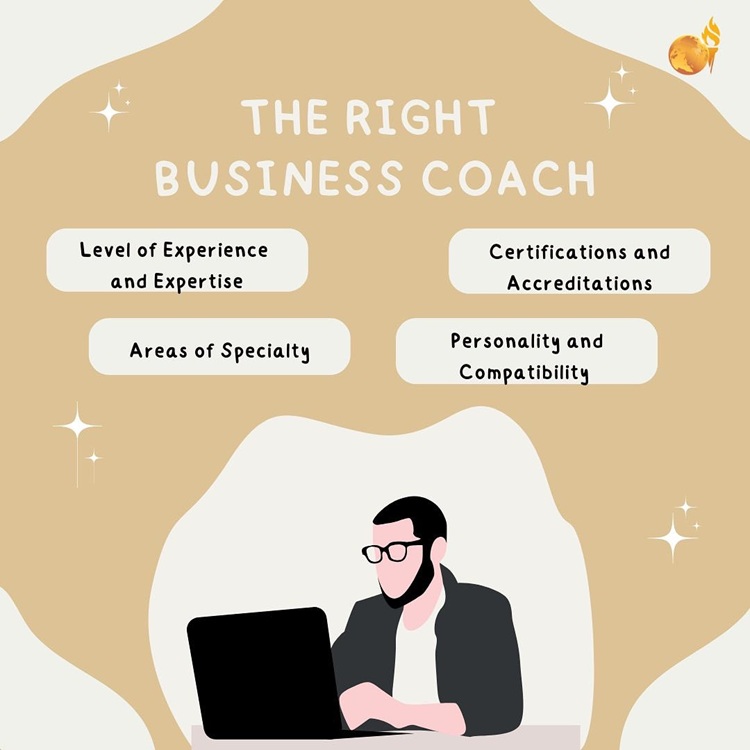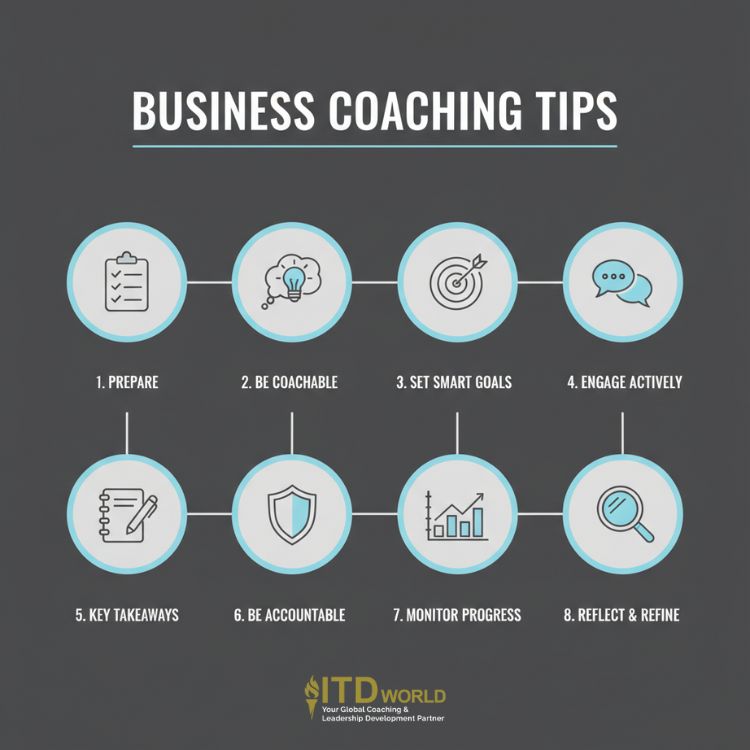Business coaching is a powerful tool for organizations to take their performance to the next level. By working with an experienced coach, leaders and business owners gain insights into areas they may be missing or need improvement in – such as marketing strategies, talent acquisition/ retention, etc. – and come up with practical steps to overcome current challenges.
|
Author: Jonathan M. Pham |
Highlights
- Definition and Function: Business coaching is a collaborative process where a coach helps individuals and companies clarify goals, set measurable plans, overcome obstacles, and improve key skills (like leadership and time management) to realize their full potential.
- Importance and Benefits: Coaching provides expert guidance and fresh, objective perspectives, helping leaders navigate complexities, avoid costly mistakes, and identify blind spots. The benefits include increased profitability and productivity, greater strategic focus, improved leadership skills, and enhanced accountability and sustainable growth.
- Effectiveness and Application: Business coaching has been proven effective, with case studies like Google and Coca-Cola reporting significant returns on investment through better effectiveness, retention, and engagement. It is recommended for leaders who feel stuck, are struggling with team morale, or have ambitious goals but lack a clear roadmap.
- Maximizing Sessions: To get the most out of coaching, clients should come prepared with a clear agenda, embrace a coachable mindset by being open to feedback, set SMART goals, actively engage, document key takeaways, and own the accountability for their action items.
What is Business Coaching?
Business coaching is a type of coaching that focuses on enabling individuals and businesses to realize their full potential. During this process, a coach works with their client to clarify goals, overcome obstacles, improve key skills, and achieve more than thought possible.
What a business coach does:
- Identifying key areas for improvement and growth opportunities.
- Setting specific and measurable goals.
- Mapping out actionable plans.
- Providing accountability and encouragement.
- Offering practical feedback.
- Helping clients expand their thinking and view things from new perspectives.
- Mastering time management, delegation, and leadership skills.
- etc.
Unlike mentoring – which draws upon the mentor’s experiences, the aim of coaching in business is to empower individuals to devise and implement strategies for improvement on their own.
Read more: Coaching vs Mentoring – Define the Differences

Why is Business Coaching Important?
Navigating the complexities of business ownership is typically challenging. Many entrepreneurs find that trying to learn everything independently is not only inefficient – but also has the potential to lead to costly mistakes. This is where the value of business coaching becomes clear.
A skilled coach acts as a guide, enabling one to better navigate challenges and identify the most effective solutions. Their years of experience in addressing organizational problems make them capable of offering tailored advice that delivers tangible results.
- Expert guidance
Instead of relying solely on trial and error, a coach provides expert guidance based on proven strategies and experience. Think of it as having a seasoned advisor in your corner, someone who has seen what works and what doesn’t in various business contexts. With their assistance, leaders are better equipped to make informed decisions, optimize resources, and accelerate the path toward success.
- Fresh perspectives
It’s easy for business owners to become entrenched in their own thinking, sometimes missing valuable opportunities. A coach brings an objective, external perspective, allowing for a more unbiased evaluation of the current situation. They can identify blind spots and uncover new possibilities that internal teams might have overlooked.
Furthermore, their role also includes providing constructive feedback, encouraging one to think outside the box, and helping refine strategies for optimal effectiveness.
We all know how easy it is to get distracted or procrastinate, even on the most critical tasks. A business coach serves as a vital accountability partner who provides regular check-ins, helps set realistic deadlines, and offers support and encouragement – so that leaders may stay committed to their objectives and move forward toward the desired outcomes.
- Personalized support
A business coach takes the time to learn about the intricacies of one’s company, the industry, as well as one’s specific goals. This allows them to tailor their advice to one’s individual needs, offer targeted solutions for one’s current obstacles, and aid in the establishment of a clear roadmap for future success.

Benefits of Business Coaching
The collaborative process is designed to create tangible and lasting improvements across the entire organization, including:
- Increased profitability & productivity
By helping leaders refine their strategies, streamline operations, and focus on high-impact activities, coaching directly contributes to the bottom line. It eliminates inefficiencies and articulates focus, enabling teams to achieve more with the resources they have.
- Greater clarity & strategic focus
It is common for entrepreneurs and leaders to be overwhelmed by a multitude of daily tasks. Coaching provides a dedicated space to step back, visualize the bigger picture, and establish a clear, actionable roadmap. This newfound clarity makes it simpler to prioritize and ensure that every business decision aligns with the long-term vision.
- Improved leadership & people management
A great coach helps develop a leader’s emotional intelligence, communication skills, and ability to motivate others. This translates into better delegation, constructive conflict resolution, and the cultivation of a positive, high-performance company culture.
- Enhanced decision-making & problem-solving
Rather than providing answers, a coach equips leaders with new models and frameworks for thinking. As such, they become better equipped to approach challenges from different angles, analyze options more critically, and make confident, well-informed choices independently.
- Higher employee engagement & retention
Effective leadership, born from coaching, is a cornerstone of a healthy workplace. When employees feel heard, valued, and see a clear path for growth, their loyalty skyrockets, leading to a lower turnover rate and saving the company significant costs associated with recruitment and training.
- Sustainable growth & innovation
Business coaching fosters an adaptive and forward-thinking mindset. It encourages one to not only solve current issues but also to proactively seek out and capitalize on new opportunities, ensuring the business remains competitive and resilient in a changing market.
Does Business Coaching Work?
When implemented properly, coaching lead to significant improvements in key areas like leadership skills, team dynamics, productivity, and the bottom line. The guidance of an experienced coach enables business owners to gain awareness of blind spots and growth opportunities – as well as to take practical steps toward overcoming challenges and reaching new heights of success.
According to the International Coaching Federation (ICF), 86% of companies that adopt coaching practices report increased profitability – 73% claim that they recouped their investment in coaching within the first year.
- Google: provided leadership coaching for senior managers and executives to aid them in realizing their untapped potential. Those who went through the program reported an average increase in overall effectiveness of 88%.
- Coca-Cola: implemented a large-scale coaching program for mid-level and senior leaders. Within 18 months, they saw a 700% return on their investment through increased retention, engagement, and productivity.
- Dell: Since launching their executive coaching programs, the company has witnessed a high return on investment through cost savings from decreased turnover and increased revenue from more effective leadership and people management.
How Do I Know if I Need Business Coaching?
For those who notice the presence of the following signs, it may be time to invest in coaching:
- You feel stuck in your business and aren’t sure how to get to the next level.
- Your team is experiencing low morale, high turnover, or other issues with dynamics or performance.
- You’re struggling with imposter syndrome or self-doubt as a leader.
- You’re having trouble balancing the demands of your business with having a personal life.
- You wish to develop skills and confidence as an entrepreneur or in key areas of leadership.
- You have ambitious goals for growth – but aren’t sure how to visualize them.
How to Find the Right Business Coach
When searching for a business coach, there are a few criteria that should be taken into consideration:
- Level of experience and expertise. Make sure the coach you choose possesses the relevant industry experience and an appropriate track record of success with other businesses.
- Certifications and accreditations. Professional coaches are often certified by organizations such as the International Coaching Federation (ICF) – which has long set worldwide standards for the practice.
- Areas of specialty. Go with one who specializes in the areas that you need support in – such as time management, team building, or financing.
- Personality and compatibility. Find someone that you feel comfortable with, have complete trust in, and are confident that they will hold you accountable throughout the process.
Read more: 8 Effective Coaching Skills for Leaders & Managers

What to Expect From a Business Coaching Session
While each coach comes with a unique style, a professional business coaching session is a structured, confidential, and collaborative meeting designed for progress. It is not a casual chat, but a focused conversation aimed at producing actionable outcomes.
A typical session is comprised of the following parts:
- Check-in
A check-in involves reviewing the progress made on the action items set in the previous meeting. You will discuss your successes, the challenges you encountered, and what you learned in the process. This opening phase reinforces accountability and celebrates momentum.
- Set the agenda
Next, you will collaboratively set the agenda for the current session – so that the conversation is focused on the most pressing needs or strategic priorities. Expect your coach to ask thought-provoking questions designed to challenge your assumptions, uncover root causes of issues, and allow you explore potential solutions you may not have considered.
Remember, the coach’s role here is not to give you the answers, but to facilitate your own discovery process.
- Next steps
You won’t leave with vague ideas; you will co-create a specific action plan outlining what you will do, by when, and how you will measure the results. Throughout the entire process, your coach should provide support, encouragement, and a safe space to be vulnerable and honest about your business challenges.
8 Tips on How to Maximize the Results of Each Business Coaching Session
-
Preparation is key
Don’t just show up; rather, you need to invest time before each session to prepare. This might involve researching relevant topics, gathering necessary documents, and clearly defining the key points or goals you want to address.
A well-defined agenda will ensure focused and productive discussions. Think about the specific challenges you’re facing and the outcomes you’re hoping to achieve.
-
Embrace coachability
A successful coaching relationship thrives on open communication and a willingness to learn. Hence, it is a good idea to always be receptive to feedback, even if it’s challenging.
Remember, your coach is there to support your growth. A coachable mindset – one that is open to new strategies and views criticism as an opportunity for improvement – is essential for making real progress.
-
Set SMART goals
Vague aspirations yield vague results. Instead of saying “I want to increase revenue,” aim for something like “I want to increase revenue by 10% within the next six months by implementing a targeted social media marketing campaign.”
SMART goals (Specific, Measurable, Achievable, Relevant, and Time-bound) provide clarity, direction, and a benchmark for measuring progress.
-
Engage actively
Coaching is a two-way process that requires both parties to actively participate in discussions. Hence, don’t hesitate to share your challenges openly and honestly with your coach. The more transparent you are, the better equipped they will be to provide tailored advice and support.
-
Document key takeaways
Instead of relying solely on memory, it is recommended that you take thorough notes during each session. This will help you retain key information, stay on track with action items, and better follow up with the feedback received.
In addition, these notes also serve as a valuable reference point for future discussions and progress reviews.
-
Own your accountability
Make sure to take ownership of the action items discussed during each session. These actions are the building blocks of your long-term success.
If you’re struggling to meet certain goals, do not be afraid to communicate the problem to your coach. They can provide additional support, resources, or adjustments to your plan.
-
Monitor and discuss progress
Be prepared to discuss both your successes and setbacks between sessions with your coach. Honest and open communication about your progress is crucial for driving meaningful business growth and making necessary adjustments to your strategy.
-
Reflect and refine
After each conversation, take time to reflect on the discussion, identify areas for improvement and any necessary changes to your approach. Consider what worked well, what could be improved, and how you can apply what you’ve learned. This reflective practice will ensure that you’re consistently moving closer to your long-term goals.
Maintaining a positive and motivated attitude is essential for success in any endeavor, including coaching. If you feel discouraged, revisit your objectives and remind yourself why you embarked on the journey.
Read more: 10 Common Coaching Challenges – Navigating Difficult Scenarios

FAQs
What is the difference between business consulting and business coaching?
Consulting is focused on strategic analysis and advice, while coaching is more on fueling guidance, support, and accountability to help clients reach their goals. In other words, the latter typically takes a more holistic approach than the former.
How often should I have business coaching sessions?
The frequency of your sessions will depend on your objectives – as well as the type of coaching you are receiving. However, a good rule of thumb is to schedule at least one session per month to make sure that you stay on track and make meaningful progress.
Is it worth paying for a business coach?
Absolutely – having a coach side by side has been proven to massively maximize one’s potential and open up endless opportunities for growth. Plus, investing in yourself is always worth it in the long run!
Read more: 10 Characteristics of a Good Coach
How to start a coaching business?
Starting a coaching business requires research, preparation, and an actionable plan that takes into account your target market, marketing strategies, and processes for managing client expectations.
To ensure successful long-term partnerships, building strong relationships should be a top priority – this is achievable by staying current with the latest industry trends and practices, providing exceptional service, and delivering results. Aside from that, communication strategies such as networking with other professionals, staying organized and providing quality services also helps develop a good reputation.
For clients to get the most out of their experience working with you, make sure to provide personalized solutions tailored to their individual needs. This could include offering online or in-person sessions, helping clients clarify their goals and objectives, providing feedback on progress made, and developing actionable next steps that they can apply in their daily life or work.

Other resources you might be interested in:
- Strategic Coaching for Competitive Advantage
- Life Coaching: Key to Finding Purpose & Fulfillment
- Coaching Culture: Building a Blueprint for Organizational Growth
- Business Process Transformation: Strategies for Success
- 65 Entrepreneur Quotes: Wisdom to Launch & Lead


